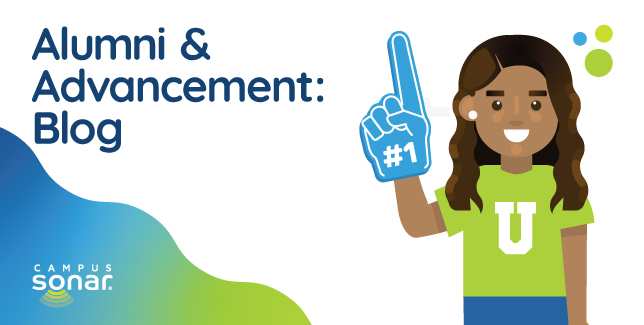Understanding the changing job market—and how it’s affecting your alumni—can help you reach them where they are and support their job search.
by Katlin Swisher, Campus Sonar Senior Strategist
 Shutdowns early in the COVID-19 pandemic brought record layoffs to the U.S. labor force. Facing an uncertain economy, 2020 college grads struggled to find employment—a challenge that persisted into 2021. Then, in April 2021, nearly four million Americans quit their jobs, the record high for a single month. This Great Resignation is yet another consequence of the pandemic, one driven by your alumni as they advocate for compassionate, equitable work environments and careers aligned with their goals and values.
Shutdowns early in the COVID-19 pandemic brought record layoffs to the U.S. labor force. Facing an uncertain economy, 2020 college grads struggled to find employment—a challenge that persisted into 2021. Then, in April 2021, nearly four million Americans quit their jobs, the record high for a single month. This Great Resignation is yet another consequence of the pandemic, one driven by your alumni as they advocate for compassionate, equitable work environments and careers aligned with their goals and values.
As seen in our Social Listening for Alumni Insights: February 2022 report, the pandemic has had widespread effects on job searching. It has created a unique career environment with wide-reaching effects—not just on new graduates, but also on younger and older alumni.
I’m unemployed because of Covid and actively looking for work with a career coach. If you think I’m taking a $12 an hour entry level customer service job when I have a college degree and 20 years of professional experience, then you can go to Hell.
Your alumni are worried. They have concerns about resume gaps, struggles with available salary ranges, and challenges finding jobs related to their degrees. They’re facing pandemic pressures from unexpected financial limitations, health concerns, and family responsibilities. Burnout is real.
minimum wage jobs are not “easy...” and NO not everyone can do them... customer service is not for everyone! it is literally hard work, stop minimizing it and telling me I don’t deserve to make a living wage... I HAVE A COLLEGE DEGREE!! try getting a salaried job during COVID bro
In that data set, we discovered that alumni often take to Twitter to express their frustration with these circumstances, and forums are full of questions relating to job searches, careers, and transitions between occupations and industries.
Social listening can inform your campus about the challenges they face and how you can help—or, at least, not worsen—the situation with out of touch content (like an untimely ask for donations).
Intentional monitoring of those content sources is valuable for understanding their circumstances. Use the intelligence from these conversations to help your career services team understand how new alumni transition from campus into their careers or how more seasoned alumni navigate mid-career shifts. These conversations can identify common questions from alumni and inform services you can provide to support their job searches, networking, and other professional development activities.
Equipped with that knowledge, consider ways to expand your existing career services programming for current students and offer it to a wider alumni audience. Alumni could benefit from resources like access to job boards, résumé reviews, and mock interviews, too!
While it is evident many alumni are facing crossroads in their careers and personal lives, they’re also willing to give back despite those challenges. They take time to answer questions and offer advice based on their own college and career experiences—not only with fellow alumni, but with current and prospective students as well.
This willingness to proactively have a conversation makes them under-the-radar influencers for your brand. They can speak firsthand to how their college experience set them apart in their job search and how their degree prepared them for the careers they have now.
Engagement in those reciprocal conversations reflect a shared interest in mentorship from alumni as well as prospective and current students. With the growing importance of mentorship in career advancement, especially for women and people of color, the establishment of new or expansion of existing mentorship programs will reflect your campus’s commitment to your graduates’ career success.
The job market conversation isn’t entirely negative, though. In the midst of the Great Resignation, many alumni made successful transitions into new jobs and different industries or created opportunities for themselves. Social listening can help you locate the positive in these conversations, too.
Reshare those examples to elevate and celebrate your alumni accomplishments, which can reassure or even inspire alumni who’ve faced similar challenges. It can also illustrate the value of college to your prospective student audience and demonstrate how your campus will prepare them for an uncertain job market.
Though higher ed is under fire more now than ever as Americans continue to question the value of a traditional college degree, you can push back with examples of community and connection. Nothing can replace the value of relationships with peers, faculty, and alumni found in the college experience.
